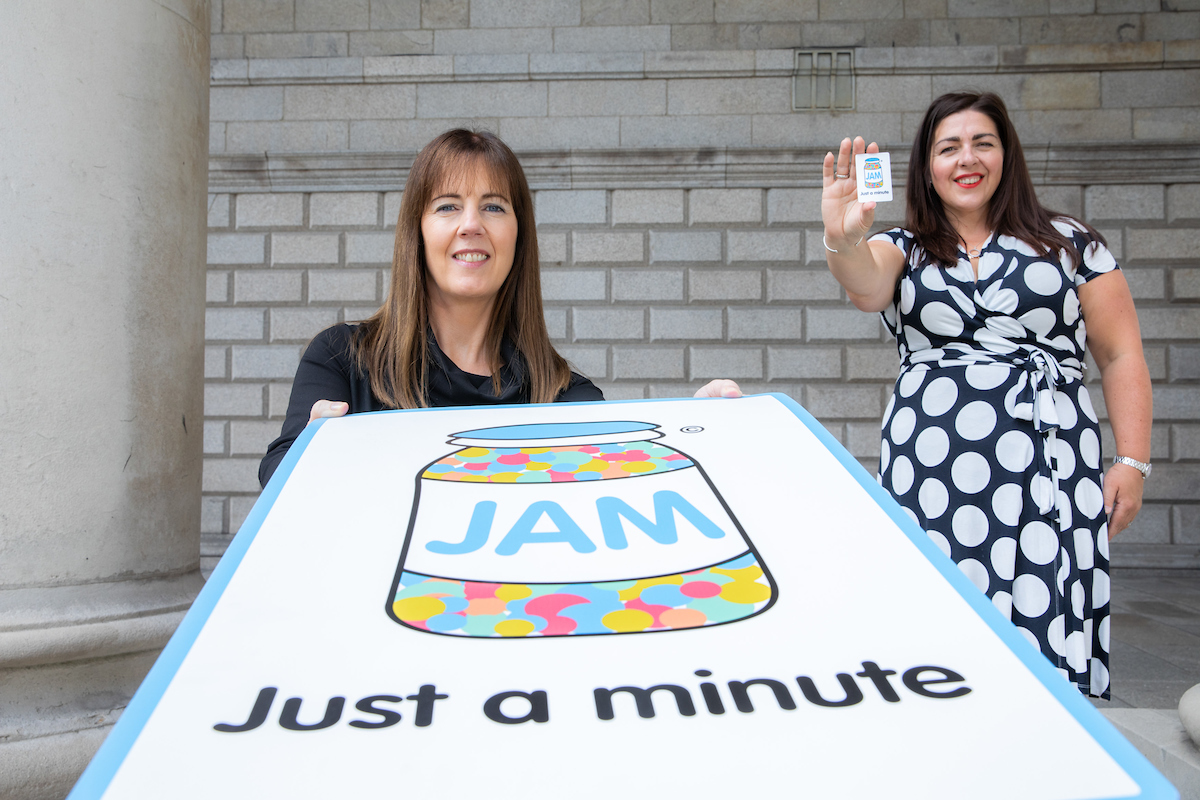Bank of Ireland branches are now JAM Card friendly

Pictured at the launch are Aine McCleary, Director of Distribution Channels at Bank of Ireland and Maeve Monaghan, Chief Executive of NOW Group, the Belfast-based social enterprise that developed the JAM Card.
- JAM Card allows people with a communication barrier to ask for “Just A Minute”
- Initiative supports the financial wellbeing of Bank of Ireland customers
20 July 2020 – Bank of Ireland has carried out training with customer-facing employees to ensure all its branches are now ‘JAM Card Friendly’.
The ‘Just A Minute’ (JAM) Card allows people with a learning difficulty, autism or communication barrier to let others know in a discreet, non-verbal way that they need a minute of patience while using shops, services and public transport. Developed by the Belfast-based social enterprise NOW Group, the JAM Card is available for free as a plastic card or as a mobile phone app and has over 35,000 users.
From today, Bank of Ireland customers can show their JAM Card in branches to let a member of staff know they need a little extra time or assistance when doing their banking. Over 2,000 branch staff in the Republic of Ireland have completed training on how to recognise and respond to the JAM Card and the service will be promoted across the bank’s branch network.
Aine McCleary, Director of Distribution Channels, Bank of Ireland, said:
“I’m delighted to announce that we’re JAM Card friendly right across our branch network. Some everyday situations that most of us take for granted, like walking into a bank branch, can be daunting for people with a communication barrier and that impacts on their financial wellbeing. The JAM Card is a really simple but ground-breaking initiative which I hope will make our branches more accessible and help all our customers feel comfortable and welcome.”
Maeve Monaghan, Chief Executive, NOW Group, added:
“Having over 2,000 Bank of Ireland staff trained to recognise and respond to customers who have a communication barrier is a proud moment for NOW Group participants who came up with the idea of the JAM Card. Excellent customer service is only truly achieved when businesses recognise that all customers expect and deserve that same level of service. We are delighted to welcome Bank of Ireland to the ever-growing JAM Card family and applaud their commitment to inclusivity.”
To find out more about the JAM Card or to request a card from NOW Group please visit https://www.nowgroup.org/jamcard. Bank of Ireland will also make 11,000 cards available for customers in its branches.
Notes to Editor
The JAM Card
The JAM Card was originally developed for those with learning disabilities and difficulties but can be used by anyone with a communication barrier. The card, which says ‘Just a minute’ on one side and ‘Please be patient I have a learning difficulty on the other’, allows people to ask for a minute of patience in any situation they need it including in shops, restaurants and public transport. It is also available as an app for smartphones that allows users to select what their screen says from options including ‘I have autism/Asperger’s’, ‘I have a condition’ and ‘I have dementia/memory problems’.
All of Bank of Ireland’s branches in Northern Ireland became ‘JAM Card Friendly’ in December 2019.
Bank of Ireland’s Vulnerable Customer Unit
Established in 2019, the Bank’s Vulnerable Customer Unit provides training, support and guidance to staff in branches and contact centres across the country to heighten awareness of vulnerable customer issues and facilitate proactive detection and effective intervention on a case-by-case basis. The unit also exists as a support line for advocacy and support groups to flag and escalate issues which they encounter.
The VCU team has completed bespoke training with advocacy and support organisations including AsIAm (autism), the National Council for the Blind Ireland (sight loss), the National Federation of Voluntary Service Providers (intellectual disability), the Rutland Centre (addiction), Sage Advocacy (vulnerable adults, older people, healthcare patients) and the Health Service Executive (HSE).